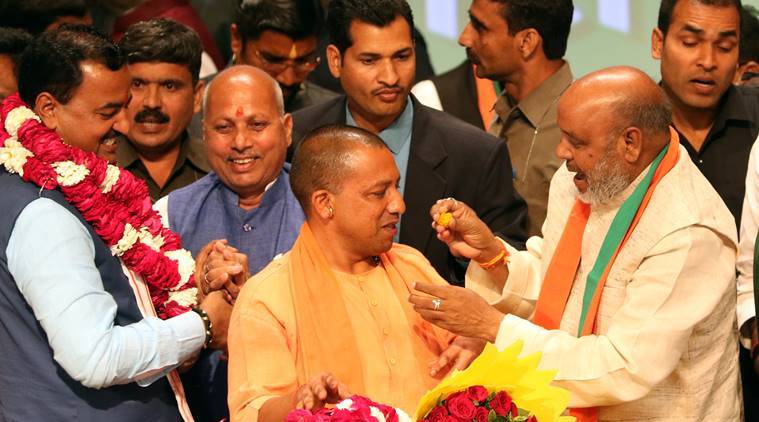After UP, What?

The spectacular victory of the Bharatiya Janata Party in the Uttar Pradesh Assembly poll was capped by the appointment of Adityanath Yogi as the Chief Minister of UP. He had not contested for the Assembly nor was he projected as the Chief Minister by the BJP before polls.
Why so many eyebrows have been raised with the nomination of Adityanath is very apparent. He has been the most assertive and aggressive face of the politics pursued in the name of religion. He has many criminal charges against him. His statements against the Muslims minority till his appointment had been dubbed as coming from ‘fringe elements’. His hate statements are innumerable and have been in the media off and on. His campaigns and speeches around ‘love jihad’, ‘ghar wapasi’, and ‘cow protection’ have made the headlines.
So, why was Adityanath preferred to other milder leaders! And that too despite the fact that he had built his own support base away from the usual RSS base. He is rooted in the Hindu Mahasabha ideology, which overlaps with the RSS ideology and politics. He has never made bones about his anti Muslim stance on most of the issues.
The reasons for his appointment thus seem to be:
1. This election result is the culmination of the processes in which communal polarization played the key role. All development issues were linked to Hindutva and the message to Hindus was that you are deprived of these fruits of Vikas (development) as Muslims are being pampered, appeased and that BJP is the only hope for the vikas of Hindus. The make believe issue of exodus from Kairana was compared by Adityanath himself to the migration of Pundits from the Kashmir valley. The BJP stance in elections was very clear, not a single seat was given to any Muslim candidate. The election results show that BJP succeeded in its strategy of ‘dividing the Muslim votes’ and uniting the Hindu votes.
2 Adityanath’s elevation is a signal that now RSS-BJP are going to use the communal card as UP has demonstrated that the minorities can be marginalised, as even their 20% presence did not matter in the final analysis.
3. The other message from his appointment as CM is of tactics, in that now the RSS-BJP is going to launch the offensive for Hindu Rashtra in an overt fashion.Adityanath himself had vouched that he wants to convert UP into a Hindu rashtra as a precursor for India. He had said after the Gujarat carnage, that UP would be the next in line.
What has been the response of opposition parties to these developments? So far mostly they have taken a suicidal path, except in the case of the Bihar Assembly elections. Many leaders have been pampering their own narrow egos rather than sticking to the values their political agenda espouses. The threat of Hindu Rashtra is not just to minorities. As such it is a threat to all what the Constitution of Indian stands for, Liberty, Equality and Fraternity, social justice and affirmative action for the weaker sections of society.
The argument put forward by many political analysts is that democratic forces need to come together at this juncture. It is true that most other parties have not been able to sustain the democratic and secular values to full earnest. They have made opportunistic alliances but most of them are within the gambit of Indian Nationalism. BJP is for Hindu nationalism. Can its march be halted?
The 2019 General elections seem to be a giveaway unless the other political formation takes Adityanath’s coming to power as a wakeup call. One has seen that a determined opposition can come to power overcoming the electoral and social engineering resorted to by BJP-RSS. In the last general elections BJP had polled 31% of the votes. In UP that time its vote share was around 41%, now in the Assembly elections it is a 39 odd percent. How do other political parties see the agenda of the BJP?
Social movements for the rights of weaker sections of society need to come up to form a platform for the defence of democracy.
The writing for the Opposition parties is clear now: either they hang together or the can prepare to be decimated in the dust of electoral politics. There are lessons from Bihar, provided they are willing to learn.



